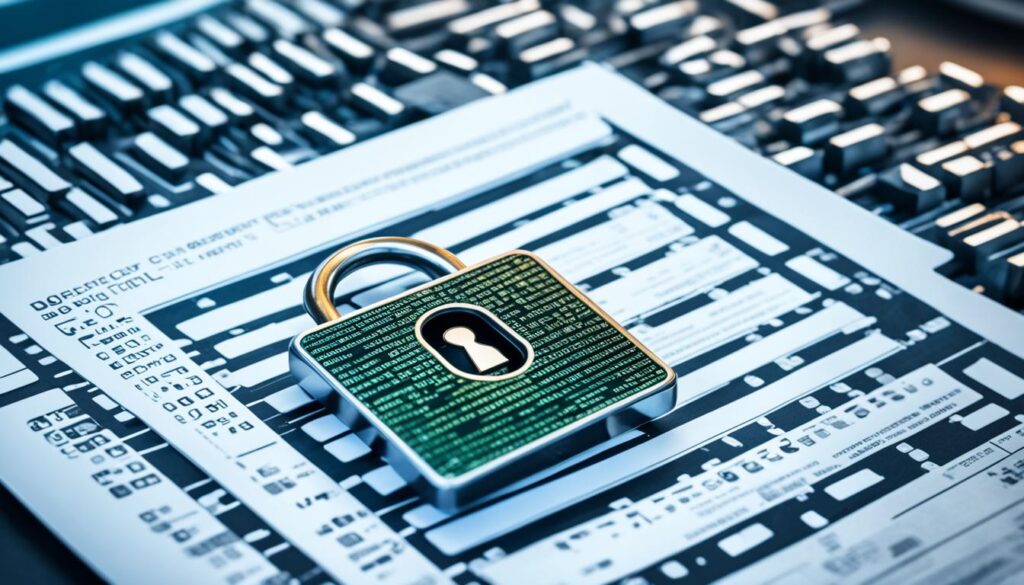As the digital age continues to transform the legal industry, the security of legal documents has become a top concern for individuals and organizations alike. Protecting sensitive information from unauthorized access and ensuring confidentiality is paramount in maintaining trust and upholding the integrity of legal processes.
In this article, I will discuss best practices for legal document security, focusing on the unique challenges and considerations in New York. Whether you are a law firm, corporate legal department, or an individual requiring legal services, understanding and implementing effective security measures is essential.
Key Takeaways:
- Implement encryption and access controls to safeguard legal documents.
- Regularly backup your documents to avoid data loss.
- Train employees on security protocols to help prevent internal breaches.
- Stay up-to-date with the latest cybersecurity measures and technologies.
- Consider using a secure cloud storage solution for enhanced accessibility and protection.
The Impact of Noneconomic Damage Caps
Proponents of raising the cap on noneconomic damages argue that it would have a significant impact on providing fair compensation to victims for pain and suffering. They believe that the current cap is particularly unfair to women and people of color. The opponents claim that the current cap disproportionately affects those who earn less money or stay at home as caregivers, resulting in an inequitable distribution of compensation.
“Raising the cap would provide fair compensation to victims and address the disparities faced by marginalized communities,” advocates argue.
On the other hand, opponents of raising the cap maintain that the current limitations on noneconomic damages already provide fair compensation and protect businesses and insurers from excessive payouts. They emphasize the potential consequences of raising the cap, warning that it would lead to higher insurance rates and increased costs for Maryland residents and businesses.
“Raising the cap would have negative consequences for the economy, businesses, and individuals, exacerbating the financial burden,” opponents caution.
The ongoing debate surrounding noneconomic damage caps highlights the divergent perspectives on the balance between compensating victims and protecting the interests of businesses and insurers. Evaluating the impact of raising the cap requires a comprehensive analysis of its potential effects on insurance rates, financial stability, and the overall well-being of all parties involved.
Key Arguments:
- Raising the cap on noneconomic damages to provide fair compensation
- Unfairness of the current cap, particularly for women and people of color
- Protecting businesses and insurers from excessive payouts
- Concerns over higher insurance rates and increased costs for residents and businesses
Implications:
The impact of noneconomic damage caps extends beyond the financial realm. It touches upon broader societal and economic considerations, such as access to justice, equality, and the balance of power between individuals and institutions. These deliberations merit careful evaluation before any decisions on adjusting the caps are made.

Legal Document Security in the Cyber Era
In today’s digital age, the security of legal documents has become increasingly essential. With the rise in cyberattacks and data breaches, protecting sensitive information is crucial to maintain the confidentiality and integrity of legal documents. From financial records to personal client information, law firms and legal professionals must take proactive measures to ensure legal document security in the cyber era.
One recent example highlights the real-world implications of cyber threats on legal document security. UnitedHealth Group, a leading healthcare company, experienced a cyberattack on its Change Healthcare unit. This incident resulted in the potential compromise of data, raising concerns about the vulnerability of confidential legal documents. To address the severity of the attack, the U.S. Department of State is offering a reward of up to $10 million for information on the ransomware-as-a-service group responsible.

The aftermath of such cyberattacks requires companies and individuals to assess the extent of compromised data. In the case of UnitedHealth Group, they are currently investigating if any protected health information or personally identifiable information was affected. While there is no concrete evidence of the stolen data being published on the dark web, the potential risk should not be underestimated.
Ensuring legal document security in the cyber era involves implementing various strategies and best practices:
- Encryption: Utilize robust encryption methods to safeguard sensitive legal documents and prevent unauthorized access.
- Access Controls: Establish stringent access controls, such as unique user credentials and permission levels, to limit document access to authorized individuals.
- Regular Backups: Regularly backup legal documents to protect against data loss caused by cyberattacks or system failures.
- Employee Training: Educate employees about cybersecurity best practices, including recognizing phishing attempts, using strong passwords, and exercising caution when handling sensitive documents.
In addition to these measures, it is crucial to stay informed about the latest cybersecurity threats and updates. Keeping software and security systems up to date and conducting regular vulnerability assessments can further strengthen legal document security.
“The consequences of a data breach can be devastating for law firms and legal professionals. Protecting the confidentiality of legal documents is not just a legal obligation; it is an ethical responsibility that should be taken seriously in the cyber era.”
By prioritizing legal document security, law firms and legal professionals can instill confidence in their clients and maintain the trust and integrity of the legal profession. Implementing robust cybersecurity measures is not only a proactive approach to mitigate cyber threats but also an essential safeguard against potential legal and reputational risks.
Conclusion
Securing legal documents is of utmost importance in maintaining the confidentiality and integrity of sensitive information. As the digital landscape continues to evolve, it is crucial for individuals and organizations to take proactive measures to protect their legal documents from unauthorized access.
Implementing best practices for legal document security plays a pivotal role in safeguarding sensitive data. Encryption technologies provide an added layer of protection by encoding documents, making them unreadable without the proper decryption key. Additionally, access controls ensure that only authorized personnel can access and modify the documents.
Regular backups are essential in case of data loss or system failure. By having multiple copies of legal documents stored in secure locations, organizations can quickly recover and restore any lost data. Moreover, employee training programs are vital to raise awareness about potential security threats, promoting a culture of vigilance and ensuring that staff members adhere to proper security protocols.
In conclusion, by implementing robust security measures, including encryption, access controls, regular backups, and employee training, individuals and organizations can significantly enhance their legal document security. Safeguarding confidential information is not only a legal obligation but also essential in maintaining trust and protecting the sensitive data of clients and stakeholders.
FAQ
What is legal document security?
Why is legal document security important?
What are some best practices for legal document security?
How can legal document security be maintained in the cyber era?
What are the potential risks of failing to secure legal documents?
How does raising the cap on noneconomic damages impact personal injury and wrongful death cases?
Why do proponents argue for raising the cap on noneconomic damages?
Why do opponents argue against raising the cap on noneconomic damages?
What is the current cap on noneconomic damages in Maryland?
How would the proposed legislation change the cap on noneconomic damages in Maryland?
FAQ
What is legal document security?
Legal document security refers to the measures and practices used to protect sensitive information and prevent unauthorized access to legal documents.
Why is legal document security important?
Legal document security is important to maintain confidentiality and protect sensitive information from being accessed or compromised by unauthorized individuals.
What are some best practices for legal document security?
Some best practices for legal document security include implementing encryption, access controls, regular backups, and providing employee training on security protocols.
How can legal document security be maintained in the cyber era?
In the cyber era, legal document security can be maintained by staying vigilant, adopting advanced security measures, and regularly updating security protocols to address emerging threats.
What are the potential risks of failing to secure legal documents?
Failing to secure legal documents can lead to unauthorized access, breaches of confidentiality, and potential legal and reputational consequences for individuals and organizations.
How does raising the cap on noneconomic damages impact personal injury and wrongful death cases?
Raising the cap on noneconomic damages can potentially provide higher compensation to victims for pain and suffering, but it may also result in increased insurance rates and costs for businesses and residents.
Why do proponents argue for raising the cap on noneconomic damages?
Proponents argue that raising the cap would provide fair compensation to victims, particularly those who earn less or face disadvantages due to their gender or race.
Why do opponents argue against raising the cap on noneconomic damages?
Opponents argue that the current cap already provides fair compensation and protects businesses and insurers from excessive payouts. They also warn about potential negative consequences such as higher insurance rates and increased costs.
What is the current cap on noneconomic damages in Maryland?
Currently, the cap on noneconomic damages in Maryland is set at 5,000.
How would the proposed legislation change the cap on noneconomic damages in Maryland?
The proposed legislation would nearly double the cap on noneconomic damages in Maryland to
FAQ
What is legal document security?
Legal document security refers to the measures and practices used to protect sensitive information and prevent unauthorized access to legal documents.
Why is legal document security important?
Legal document security is important to maintain confidentiality and protect sensitive information from being accessed or compromised by unauthorized individuals.
What are some best practices for legal document security?
Some best practices for legal document security include implementing encryption, access controls, regular backups, and providing employee training on security protocols.
How can legal document security be maintained in the cyber era?
In the cyber era, legal document security can be maintained by staying vigilant, adopting advanced security measures, and regularly updating security protocols to address emerging threats.
What are the potential risks of failing to secure legal documents?
Failing to secure legal documents can lead to unauthorized access, breaches of confidentiality, and potential legal and reputational consequences for individuals and organizations.
How does raising the cap on noneconomic damages impact personal injury and wrongful death cases?
Raising the cap on noneconomic damages can potentially provide higher compensation to victims for pain and suffering, but it may also result in increased insurance rates and costs for businesses and residents.
Why do proponents argue for raising the cap on noneconomic damages?
Proponents argue that raising the cap would provide fair compensation to victims, particularly those who earn less or face disadvantages due to their gender or race.
Why do opponents argue against raising the cap on noneconomic damages?
Opponents argue that the current cap already provides fair compensation and protects businesses and insurers from excessive payouts. They also warn about potential negative consequences such as higher insurance rates and increased costs.
What is the current cap on noneconomic damages in Maryland?
Currently, the cap on noneconomic damages in Maryland is set at $875,000.
How would the proposed legislation change the cap on noneconomic damages in Maryland?
The proposed legislation would nearly double the cap on noneconomic damages in Maryland to $1.75 million.
.75 million.